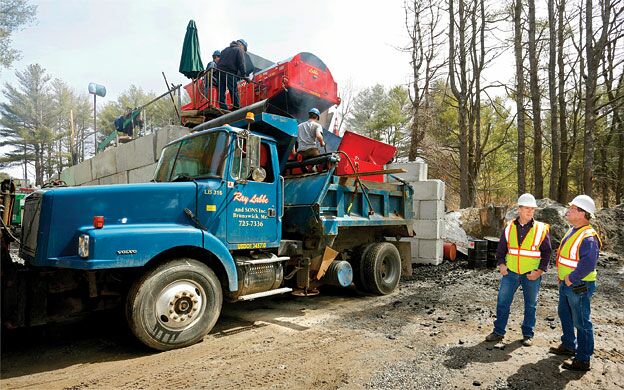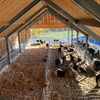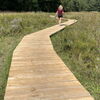Smooth Ride: Brunswick construction company's investment paves the way for new business
 PHOTo / Tim Greenway
Bob Walton, senior estimator and project manager at Ray Labbe and Sons, left, and Peter Labbe, president, say their new asphalt machine has extended the Brunswick company's paving season to year-round.
PHOTo / Tim Greenway
Bob Walton, senior estimator and project manager at Ray Labbe and Sons, left, and Peter Labbe, president, say their new asphalt machine has extended the Brunswick company's paving season to year-round.
In years past, Brunswick-based Ray Labbe & Sons had to leave the state to find asphalt that his paving and construction company could use to patch holes deep into the winter. That's because Maine's asphalt producing plants generally closed down between Thanksgiving and Christmas, and didn't reopen until April.
“If we needed any hot top in the middle of the winter, we would have to run down as far as Boston,” says Paul Labbe, vice president of the Brunswick-based company.
But the promise of a contract to help Maine Natural Gas lay its new lines in Augusta and Gorham provided an opportunity that Labbe & Sons couldn't pass up. The business has invested over $200,000 in new asphalt reclamation equipment, which allows them to make their own small batches of asphalt from recycled roadway materials year-round.
“We have virtually paved every day, except for the days it snows,” Labbe says of this recent winter season.
He says the new equipment could be a game-changer, not just for his business, but for other contractors hampered by Maine's winters trying to meet year-round demands for infrastructure improvements.
Looking for a solution
Ray Labbe & Sons first began to look into new equipment when it received a request for winter help from Maine Natural Gas. Facing increased demand for natural gas lines to businesses and residents, MNG was looking for ways to press on through the winter.
The company, run by Paul Labbe and his brother Peter Labbe, searched on the Internet for cost-effective solutions. They found Bagela, a German company that makes smaller-scale portable asphalt recycling equipment. The Bagela asphalt machine heats up small batches of recycled roadway material to melt down into new asphalt, sometimes right on the job site.
MNG assured Ray Labbe & Sons that if the company made the investment, it would have enough paving work in the winter; that was enough for Labbe to take the plunge. The company now has four people trained to use the Bagela equipment and has assisted in natural gas infrastructure projects throughout the winter.
The Bagela recycling equipment looks like an oversized Dumpster, but it acts like a cement mixer. Discarded asphalt and road millings are fed into a container, where it is heated and mixed, along with some additives to help reconstitute and bind the ingredients. The finished product then can be poured into hotboxes that can be transported to job sites. Once mixed and in the boxes, the material is good to use for 24 hours.
As with any new technology, there has been a learning curve, but so far things have run smoothly, says Labbe. Most of the paving being done with the Bagela equipment is for temporary patches for roadways that will have to be paved over completely in the spring. Some is intended to be a permanent fix. Bagela says its product can build road that lasts as long as standard asphalt, but it must be done right, says Labbe Senior Estimator and Project Manager Bob Walton. And since it's a new product, only time will tell if Bagela's claims are correct.
“We're hoping that the permanent paving we're doing is going to hold up,” Walton says.
If it does, it could prove a boon to municipal budgets and Maine's economy. In emergencies, Maine roads can be repaired in winter, but those repairs come at a steep cost. Municipalities and the Maine Department of Transportation have several options, none of which offer a permanent solution. One option is Cold Patch, which is a mix of asphalt that has been chemically modified to pour into potholes easily. While it hardens quickly and can be applied in cold weather, it must be replaced once the weather allows. Another solution is to pour in a temporary concrete patch. That works in the short-term, but needs a lot of maintenance just to survive until spring.
“Longevity is the key,” says Labbe. “Cold Patch generally is about $125 a ton to purchase. We're selling Bagela asphalt for $150 a ton.”
There may be a “green” component to using this asphalt technique over Cold Patch, as well, as it is a handy way to recycle asphalt and road millings for direct use. The Bagela is also marketed as a less polluting way to make pavement.
“There is no direct flame to the product,” Labbe says. “It's like convection-oven cooking.”
But not everyone agrees with its eco-friendly claim. Eric St. Louis, an engineer who makes his own line of asphalt recycling equipment with St. Louis Industries in Quebec, wrote in a blogpost that he believes the Bagela machines are like an unregulated asphalt plant.
“Their greatest sin [is] the clouds of dense blue smoke produced by force-heating the asphalt. It pours from both ends of this so-called recycler,” he wrote in the post. “These trailer-mounted machines often escape existing clean air regulations because they are not considered permanent installations.”
A greater concern, says Watson, to most municipal and industrial planners, is the novelty of the technology, which could hamper its widescale adoption.
Some municipalities are shy about being early adopters, says Watson. Ray Labbe & Sons has hosted demonstrations for municipalities of the Bagela technique, but some officials who have seen it just haven't been interested.
“Sometimes, change can be kind of tough,” Watson says. “We've even offered to give away some hot mix just to get people used to it.”
Making an impression
Jerry Dostie, street superintendent for the city of Augusta, was one of the city officials who watched a demonstration as part of the approval process to allow Maine Natural Gas to continue gas pipeline installations throughout the winter. He says he came away impressed. Augusta ultimately allowed Maine Natural Gas to continue pipeline work, and the paving has withstood the rigors of a Maine winter.
“We have monitored the material and have had very few issues. It has withstood the plowing operations and does not appear to be affected by the freeze/thaw cycles,” Dostie writes in an email to Mainebiz.
Ray Labbe & Sons is apparently the first company in Maine to try this winter paving technique. (The Maine Asphalt Paving Association did not return calls for this story.) The idea appears to be catching on. The company just sold its first eight tons of this new asphalt mix to the state for roadwork near Bangor. It also just closed a deal to sell 40 tons to another paving contractor in Maine. Labbe believes his company won't be the only player in winter asphalt production in the years to come.
“We anticipate that there will be more of these next year,” Labbe says. “Within 10 years, a lot of people will have them.”
Winter paving could have an outsized impact on the economy in a state where winter can last half the year. A sizable portion of Maine's contracting jobs use outdoor laborers, and hiring inevitably slows down with inclement weather. Ray Labbe & Sons employs some 49 seasonal workers, and 35 workers year-round, with many of those permanent workers driving snowplows in winter. Labbe and Walton hope this new equipment will help them provide more year-round work, not just for their employees, but for other contractors, as well.
”There's no reason to stop just because it's Old Man Winter,” says Walton.
Scott Kelly, president of Enterprise Trenchless Technology Inc. in Lisbon Falls, says the paving technique has allowed his company to continue to work much later in the winter to lay pipeline.
“It was invaluable this winter, with the nearest paving plant being in Boston,” Kelly says. “It was a great tool for us and kept us going.”
Adopting a new paving technique fits in well with Ray Labbe & Sons' history of adapting its business model to meet the needs of customers. Labbe's father and mother, Ray Labbe and Madeline Labbe, opened a gas station in Brunswick in 1951 that also serviced automobiles. Soon, they began to offer welding and snowplowing. By 1955, the Labbes sold the gas station and instead created an excavation company.
The business steadily grew, with Ray excavating and Madeline driving the truck, and they still managed to find time to raise 11 children. The Labbes' children have worked for the business ever since. While Paul Labbe knows the advantage the company now enjoys won't last forever, he still is pleased that they've found a market advantage in paving innovation.
“It's always better to lead the parade,” he says.
Craig Idlebrook, a writer based in Massachusetts, can be reached at editorial@mainebiz.biz.










Comments